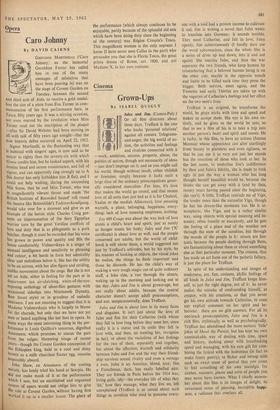Opera
Caro Johnny
By DAVID CAIRNS
GIOVANNI M ARTINELLI ('CU() Johnny,' as the immortal Geraldine Farrar has called him in one of the many messages of salutation that have been pouring in) was on the stage of Covent Garden on Tuesday, between the second and third acts of Aida, to receive a gold medal- lion the size of a plate from Eva Turner in com- memoration of his first performance here, in Tosca, fifty years ago. It was a stirring occasion, not even marred by the revelation when Miss Turner read out the inscription of the plaque —after Sir David Webster had been moving us all with talk of fifty years ago tonight—that the now historic debut occurred on April 22, 1912.
Signor Martinelli, in the fluctuating way that is habitual with singers' ages, is now said to be nearer to eighty than the seventy-six with which Grove credits him, but he looked superb, with his leonine head and serene countenance, and full of Vigour, and can apparently sing strongly up to A (his doctor has only forbidden him B flat), and I could not help wishing, during the succeeding Nile Scene, that he and Miss Turner, who was In magnificently vibrant throat and made 'the British Institute of Recorded Sound' roll round the theatre like Briinnhilde's Todesverkundigung, would take over for a moment and give us an example of the heroic style. Charles Craig pre- sents an impersonation of the fiery Egyptian Warrior torn by the great Verdian conflicts of love and duty that is as phlegmatic as a pork butcher, though it must be recorded that his voice has grown in power and quality and fills the house comfortably. Vishnevskaya is a singer of unusual intelligence and sensitivity to phrasing and colour, a bit harsh in forte but admirably clear and melodious below it. She has the ability to be an actress, with her slim figure and striding, catlike movements about the stage. But she is not Yet an Aida, either in feeling for the part or in deportment (an air-clutching, white-of-the-eye- exposing anthology of silent-film gestures with occasional sideslips into Nineteenth Dynasty, how Street style) or in grandeur of melodic utterance. I am not meaning to suggest that it is Madame Vishnevskaya who is largely to blame for the charade, but only that we have not yet seen or heard anything like her best in opera. In some ways the most interesting thing in the per- formance is Louis Quillico's sonorous, dignified Amonasro, which promises to rescue the part from the vulgar, blustering image of recent Years—though the Covent Garden conception of the Ethiopian king, bald as a coot and shiny brown as a milk chocolate Easter egg, remains Impossibly absurd.
John Shaw, an Amonasro of the ranting variety, has lately tried his hand at Scarpia. He did not make much of it at the performance which I saw, but an established and organised sYstem of opera would not oblige him to give the role at Covent Garden. without having first Worked it up in a smaller house. The glory of
the performance (which always continues to be enjoyable, partly because of the splendid old sets which have been doing duty since the beginning of the century) was Rdgine Crespin's Tosca. This magnificent woman is the only soprano I know (I have never seen Callas in the part) who persuades you that she is Floria Tosca, the great prima donna of Rome, aet. 1800, and not Madame X, in her own costume.






































 Previous page
Previous page